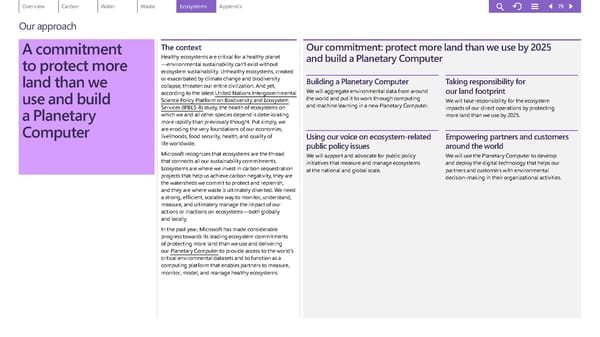Our approach A commitment to protect more land than we use and build a Planetary Computer The context Healthy ecosystems are critical for a healthy planet —environmental sustainability can’t exist without ecosystem sustainability. Unhealthy ecosystems, created or exacerbated by climate change and biodiversity collapse, threaten our entire civilization. And yet, according to the latest United Na tions Intergovernmental Science Policy Platform on Biodiversity and Ecosystem Services (IPBES-8) study, the health of ecosystems on which we and all other species depend is deteriorating more rapidly than previously thought. Put simply, we are eroding the very foundations of our economies, livelihoods, food security, health, and quality of life worldwide. Microsoft r ecognizes that ecosystems are the thread that connects all our sustainability commitments. Ecosystems are where we invest in carbon sequestration projects that help us achieve carbon negativity, they are the watersheds we commit to protect and replenish, and they are where waste is ultimately diverted. We need a strong, efficient, scalable way to monitor, understand, measure, and ultimately manage the impact of our actions or inactions on ecosystems—both globally and locally. In the past year, Microsoft has made considerable progres s towards its leading ecosystem commitments of protecting more land than we use and delivering our Planetary C omputer to provide access to the world’s critical environmental datasets and to function as a computing platform that enables partners to measure, monitor, model, and manage healthy ecosystems. Our commi tment: protect more land than we use by 2025 and build a Planetary Computer Building a Planetary Computer We will aggregate environmental data from around the world and put it to work through computing and machine learning in a new Planetary Computer. Using our voice on ecosystem-related public policy issues We will support and advocate for public policy initiatives that measure and manage ecosystems at the national and global scale. Taking responsibility for our land footprint We will take responsibility for the ecosystem impacts of our direct operations by protecting more land than we use by 2025. Empowering partners and customers around the world We will use the Planetary Computer to develop and deploy the digital technology that helps our partners and customers with environmental decision-making in their organizational activities. 79
 Environmental Sustainability Report | Microsoft Page 78 Page 80
Environmental Sustainability Report | Microsoft Page 78 Page 80